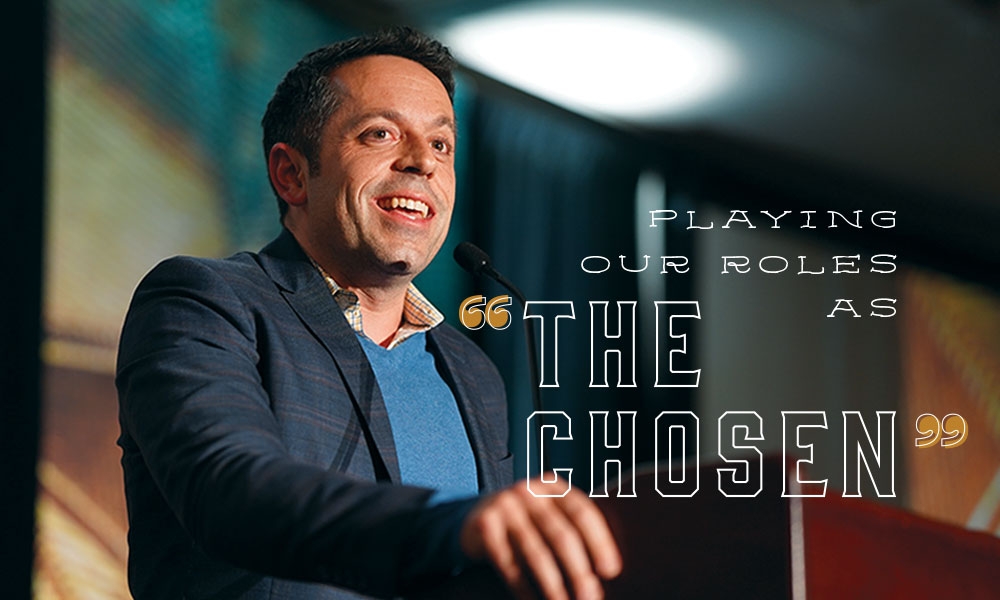
Playing our roles as the chosen
In an interview promoting the release of season five of his groundbreaking hit show, “The Chosen,” creator, director, co-writer and executive producer Dallas Jenkins summarized the central question confronting the disciples of Jesus: Can you still have faith when you don’t understand what God is doing?
“The Chosen” is one of the most popular entertainment phenomena in our culture. It’s projected to reach a potential 1 billion viewers before its ultimate seven-season conclusion. What makes it unique is that it’s a Jesus story that doesn’t primarily focus on Jesus.
“The Chosen” is about the chosen — the twelve apostles and the growing cadre of followers known as Jesus’ disciples. In their stories, admittedly fictionalized for dramatic effect, we see the very human ways in which everyday people struggled to accept what they saw in Jesus, yet believe in what they could not see. Through faith and faith alone, they devoted themselves to the mission of the Gospel: to be disciples and to make disciples of all people.
In an interview promoting the release of season five of his groundbreaking hit show, “The Chosen,” creator, director, co-writer and executive producer Dallas Jenkins summarized the central question confronting the disciples of Jesus: Can you still have faith when you don’t understand what God is doing?
“The Chosen” is one of the most popular entertainment phenomena in our culture. It’s projected to reach a potential 1 billion viewers before its ultimate seven-season conclusion. What makes it unique is that it’s a Jesus story that doesn’t primarily focus on Jesus.
“The Chosen” is about the chosen — the twelve apostles and the growing cadre of followers known as Jesus’ disciples. In their stories, admittedly fictionalized for dramatic effect, we see the very human ways in which everyday people struggled to accept what they saw in Jesus, yet believe in what they could not see. Through faith and faith alone, they devoted themselves to the mission of the Gospel: to be disciples and to make disciples of all people.
A Personal Calling
But if Jesus’ Great Commission is clear, why are there so many barriers in the call to discipleship?
Dan Cellucci, President and CEO of the Catholic Leadership Institute (CLI), says there are many. “For one, the landscape in which many of us grew up, especially if we are over age 50, is completely different. We were formed in and for Christendom, when society was with us, and now we are in times more like the early Church, where it seems like there are a lot of societal tensions with people who profess faith,” Cellucci says.
“Connected to that, some of the fundamental assumptions that many of our current structures and strategies are built on, are no longer present. For example, the traditional parish religious education program of an hour a week, taught by a volunteer, presumes that the child is coming from a household where the parents feel equipped to be the primary teachers of the faith or even know it’s their job,” Cellucci says.
“Lastly,” Cellucci says, “trust in institutions in general is low and therefore, personal witness becomes even more important. But as Catholics, it’s only really been in the last decade or so that we have begun to provide formation or even feel comfortable saying that’s an authentically Catholic thing to do!”
Measuring Discipleship
Because this call to missionary discipleship is such a challenge for individuals and the Church as a whole, America’s bishops have made promotion of missionary discipleship a primary element of the USCCB’s pastoral priorities.
But how do bishops implement this priority in their dioceses? And how can they know if their efforts are successful?
Cellucci cites metrics that help Church leaders gauge the overall growth of parishioners in the quest for discipleship. “I would define success for a diocese through some leading and lagging metrics. On the leading side, is ‘missionary discipleship’ increasingly in the lexicon of the local church?
Can priests and lay leaders articulate what missionary discipleship looks like?”
On the other hand, lagging metrics tend to be the more traditional ways in which we measure engagement in parish life, such as the number of OCIA candidates or adult baptisms, convalidations of marriages, or vocational inquiries for the priesthood or religious life. “While Mass attendance is one we focus on, for missionary discipleship, we want to look beyond Mass attendance to see ways people are taking a next step in their life of faith.”
Discipleship doesn’t need to be a nebulous concept that defies measurement. For the past ten years, CLI has used its Disciple Maker Index (DMI) with 750,000 respondents from over 80 dioceses, reflecting more than 3,000 parishes, administered in 19 languages. “We invite people to reflect on where they are in their journey of faith — from their attitudes and beliefs to their individual and communal practice of the faith,” Cellucci says. “It’s not a rating as much as an opportunity to take stock.”
Strategically Growing Disciples
What can parishes do with this kind of data? Cellucci counsels pastors and parish leaders to focus on four marks that, in his research, define a thriving parish. “First, a parish should create a plan for the spiritual maturity of its people — recognizing that parishioners are in very different places. Creating segmented and targeted opportunities to meet people where they are can help them take a next step,” he says. “Second, through coaching with the pastor, and formation of parish leadership, staff, and volunteers, parishes can cultivate a spirit of shared leadership.”
Cellucci also urges parishes to emphasize improving the Sunday worship experience, giving parishioners an opportunity to give feedback on hospitality, music, and homilies. “Lastly, and maybe most challenging for all of us, we try to challenge parish leaders to consider the world around them — the larger community in which their parish is situated — and embrace a missionary impulse. We want them to see themselves not as a place where people come, but rather a place that sends people out to meet the needs of the neighborhood in how they connect others with Christ.”
Leadership that Connects
Cellucci says the movement to build missionary disciples must be reflected in word and deed. “Time is one of the most precious assets we are given and we need to make sure we are investing the time in these initiatives. Time in prayer, time in teaching people how to pray, forming them in the life of a disciple. If we are too busy to pray, we are too busy to be serious about discipleship,” he says.
"If we are too busy to pray, we are too busy to be serious about discipleship."
“We also need to adjust structures whether they be central administration staffs, budgets, or even physical spaces to reinforce and teach our people. For example, if we say missionary discipleship is a priority, but it receives the least amount of budget dollars, how serious are we about getting people to shift their priorities?”
Cellucci says the effort to grow missionary disciples ultimately begins with the bishop. “The bishop is an important witness to the life of a missionary disciple. How present is he in the parishes and in the wider culture of the diocese? How is he consciously carving out time to be with those who might have one foot out the door or be on the margins of the Church?”
“Something that I’ve recently grown to appreciate is our identity to our particular church — the diocese. I think it’s important for people to know their bishop — to know of him, to understand their connection to him, and his connection to the apostles and to this ‘one, holy, Catholic, and apostolic’ faith,” he says.
“I am a son of the Church of Philadelphia. It’s kind of cool to consider that St. Paul wrote to the Galatians, and in the same way, Scripture is written to me and my fellow Philadelphians.”

